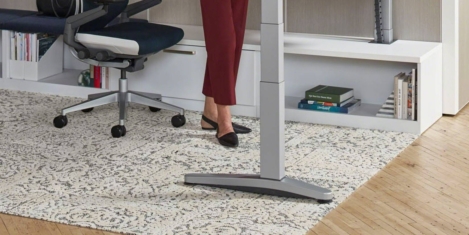August 22, 2018
SMEs more likely to offer flexible working than larger businesses
 More SMEs than larger businesses offer flexible working as a way of reducing absences, research from industry body Group Risk Development (GRiD), suggests. The research showed that 35 percent of SMEs with up to 249 employees are actively using flexible working strategies to combat absence compared to just 23 percent of organisations with over 250 employees. Drilling down further into the detail, 38 percent of micro businesses with between 1 and 9 employees use flexible working as a means to reduce absence. Flexible working now means a lot more than allowing an employee to work from home when they are feeling under the weather, and following changes in the law in 2014, it is now an option for everyone with at least 26 weeks continuous employment to request it – not just those with children or carer responsibilities. It also includes part-time working, term-time working, job sharing, compressed hours and flexitime. A greater degree of flexibility can increase productivity and reduce burn out, particularly in stressful occupations.
More SMEs than larger businesses offer flexible working as a way of reducing absences, research from industry body Group Risk Development (GRiD), suggests. The research showed that 35 percent of SMEs with up to 249 employees are actively using flexible working strategies to combat absence compared to just 23 percent of organisations with over 250 employees. Drilling down further into the detail, 38 percent of micro businesses with between 1 and 9 employees use flexible working as a means to reduce absence. Flexible working now means a lot more than allowing an employee to work from home when they are feeling under the weather, and following changes in the law in 2014, it is now an option for everyone with at least 26 weeks continuous employment to request it – not just those with children or carer responsibilities. It also includes part-time working, term-time working, job sharing, compressed hours and flexitime. A greater degree of flexibility can increase productivity and reduce burn out, particularly in stressful occupations.











 As fresh graduates from generation Z, i.e. those born between the mid 1990’s and 2000 are enter the workplace, new research from Perkbox claims that over 1 in 3 (36 percent) admit that the workplace perks are one of the most important deciding factors on whether to accept a new job or not. These post-millennials are also the group most likely (32 percent) to prefer smaller benefits that they can enjoy on a more frequent basis, all-year-round, over one annual event, such as a Christmas party. The top three workplace perks most popular amongst Generation Z included simple benefits, such as receiving a day’s annual leave on your birthday (86 percent), followed by free coffee and hot drinks (85 percent), and flexi-hours (83 percent). Despite this, Generation Z feel less deserving of workplace benefits than co-workers born pre-1995, with fewer than half (38 percent) believing they should benefit from such offerings – which is less than any other age group.
As fresh graduates from generation Z, i.e. those born between the mid 1990’s and 2000 are enter the workplace, new research from Perkbox claims that over 1 in 3 (36 percent) admit that the workplace perks are one of the most important deciding factors on whether to accept a new job or not. These post-millennials are also the group most likely (32 percent) to prefer smaller benefits that they can enjoy on a more frequent basis, all-year-round, over one annual event, such as a Christmas party. The top three workplace perks most popular amongst Generation Z included simple benefits, such as receiving a day’s annual leave on your birthday (86 percent), followed by free coffee and hot drinks (85 percent), and flexi-hours (83 percent). Despite this, Generation Z feel less deserving of workplace benefits than co-workers born pre-1995, with fewer than half (38 percent) believing they should benefit from such offerings – which is less than any other age group.
 Total real estate investment in Europe decreased by 8 percent in the second quarter of this year, but there has been strong growth in the offices sector, with volumes totalling €29bn, compared to €24.1bn for the same period last year. Office investment for the first half of the year was also up 11 percent on the same period last year. Furthermore, investment into other areas, including healthcare and student accommodation, remained resilient, with volumes on par with that of last year and 6 percent up on the first half of 2017. Following a more subdued start to the year, the UK posted a strong second quarter. Total investment in Q2 2018 reached €19.9bn, driven by a record quarter for London City office investment. Jonathan Hull, managing director of Investment Properties, EMEA at CBRE commented: “Despite ongoing political uncertainties, the UK remains an attractive destination for European and global capital.”
Total real estate investment in Europe decreased by 8 percent in the second quarter of this year, but there has been strong growth in the offices sector, with volumes totalling €29bn, compared to €24.1bn for the same period last year. Office investment for the first half of the year was also up 11 percent on the same period last year. Furthermore, investment into other areas, including healthcare and student accommodation, remained resilient, with volumes on par with that of last year and 6 percent up on the first half of 2017. Following a more subdued start to the year, the UK posted a strong second quarter. Total investment in Q2 2018 reached €19.9bn, driven by a record quarter for London City office investment. Jonathan Hull, managing director of Investment Properties, EMEA at CBRE commented: “Despite ongoing political uncertainties, the UK remains an attractive destination for European and global capital.”










 At the risk of stating the obvious, with the Met Office suggesting temperatures could reach their peak on Friday (27 July) in some areas of the UK, Britain’s largest employer organisation is encouraging companies to consider ‘a range of measures to keep employees comfortable during the heatwave’. Matthew Fell, CBI Chief UK Policy Director, said: “While the current hot spell has provided welcome fillip for consumer-facing sectors, large numbers of employees are feeling the heat as they carry out their day-to-day tasks, especially those working outdoors. Responsible employers take the welfare of their employees very seriously, particularly during this unusual weather. Companies can help keep their employees cool by considering a range of measures, from flexible working to help those with punishing commutes to relaxed dress codes, so staff feel more comfortable in their place of work. Ultimately a common sense approach is needed, as some employees will have less flexibility than others, for example those wearing safety equipment on construction sites. In all cases, staff should have easy access to drinking water as temperatures soar to help keep them healthy and productive.”
At the risk of stating the obvious, with the Met Office suggesting temperatures could reach their peak on Friday (27 July) in some areas of the UK, Britain’s largest employer organisation is encouraging companies to consider ‘a range of measures to keep employees comfortable during the heatwave’. Matthew Fell, CBI Chief UK Policy Director, said: “While the current hot spell has provided welcome fillip for consumer-facing sectors, large numbers of employees are feeling the heat as they carry out their day-to-day tasks, especially those working outdoors. Responsible employers take the welfare of their employees very seriously, particularly during this unusual weather. Companies can help keep their employees cool by considering a range of measures, from flexible working to help those with punishing commutes to relaxed dress codes, so staff feel more comfortable in their place of work. Ultimately a common sense approach is needed, as some employees will have less flexibility than others, for example those wearing safety equipment on construction sites. In all cases, staff should have easy access to drinking water as temperatures soar to help keep them healthy and productive.”








